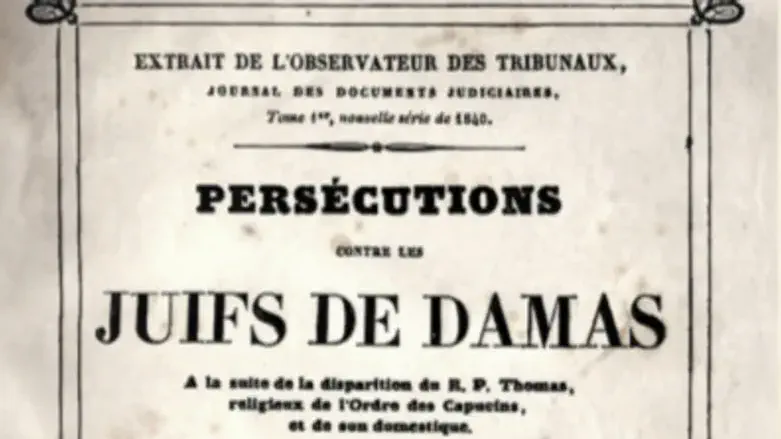
The events began on Rosh Chodesh Adar I, February 5, 1840, when a monk and his servant mysteriously disappeared in Damascus. A malicious rumor quickly spread, accusing the city’s Jews of kidnapping and murdering them to use their blood for baking Passover matzah. The French consul in Damascus, a notorious antisemite, seized upon the opportunity and formally accused the Jewish community of ritual murder.
Prominent Jewish leaders were arrested, brutally tortured, and many were forced to confess to the false charges. The intensity of the persecution shocked the Jewish world and led to urgent intervention by Sir Moses Montefiore and Adolphe Crémieux—who later became the first president of Alliance Israélite Universelle. They embarked on a special mission to the Egyptian ruler Muhammad Ali, aiming to secure the release of the detainees and clear the community’s name. Eventually, the arrests were overturned, and the ruler ordered the execution of the governor of Damascus. However, justice was never truly served for the Jews of Damascus, who continued to live under a shadow of fear and suspicion.
Now, 185 years since the Damascus Blood Libel – a rare document has been revealed.
At theAlliance Museum, a virtual museum dedicated to documenting and telling the heritage story of Jewish communities where the “Alliance Israélite Universelle” operated, a special exhibition titled "The Damascus Community" was recently opened. This digital exhibition unveils rare documentation of the Jewish community’s life in the city.
As part of the museum's ongoing historical research, an extraordinary document was discovered, shedding light on the Damascus Blood Libel of 1840.
The document, titled "Persecutions Against the Jews of Damascus," was published in Paris that same year and sold for 1 franc and 75 centimes. It was written with the intent of documenting the dramatic events that shook the Jewish world and exposed the depth of the persecution that the Jewish community in Damascus suffered due to a false rumor.

This blood libel, one of the first recorded in the modern era, became an early symbol of dangerous "fake news"—an accusation that took a heavy toll on an entire community due to deliberately spread misinformation.
The Damascus Community exhibition at the Alliance Museum is dedicated to documenting Jewish life in the city before and after the blood libel. Through testimonies, rare documents, and historical photographs, visitors can see how the community was forced to adapt to a new reality of constant fear and repeated accusations. The libel deeply traumatized the local Jewish community—many lived in fear of the population that had absorbed the incitement, and some even migrated to cities like Aleppo, Beirut, and Jerusalem to escape the hostile atmosphere.
The Damascus Blood Libel has been extensively researched by historians, highlighting its role in the emergence of Jewish journalism in Europe. The case played a background role in the decision to establish the Alliance Israélite Universelle and marked a pivotal moment when Jews worldwide realized the need to unite against antisemitism and act collectively to protect themselves. For the first time, an international public campaign was launched on behalf of a persecuted Jewish community—setting a precedent for similar efforts in the future, one that is sorely needed today.
Today, in an era where fake news can become a dangerous tool in the hands of extremists, the Damascus Blood Libel serves as a more relevant warning than ever. It reminds us how dangerous the spread of false information can be and how a baseless rumor can lead to the devastating persecution of an entire community. The story of this community, carefully preserved in the Damascus exhibition at the Alliance Museum, along with the newly discovered document ‘Persecutions Against the Jews of Damascus’ in the museum’s archive, is not just a historical testimony—it is a call to continue learning from the past to shape a better future.
The Damascus Blood Libel is not merely a painful chapter in Jewish history; it is also a powerful lesson about the impact of prejudice and how a single rumor can be weaponized.
Hani Memram- is Deputy CEO of Alliance Israélite Universelle and curator of the museum.